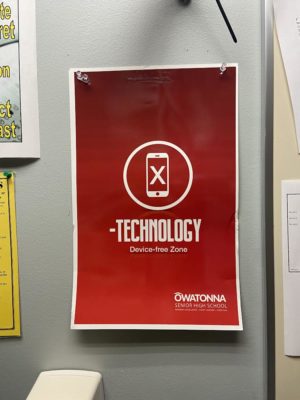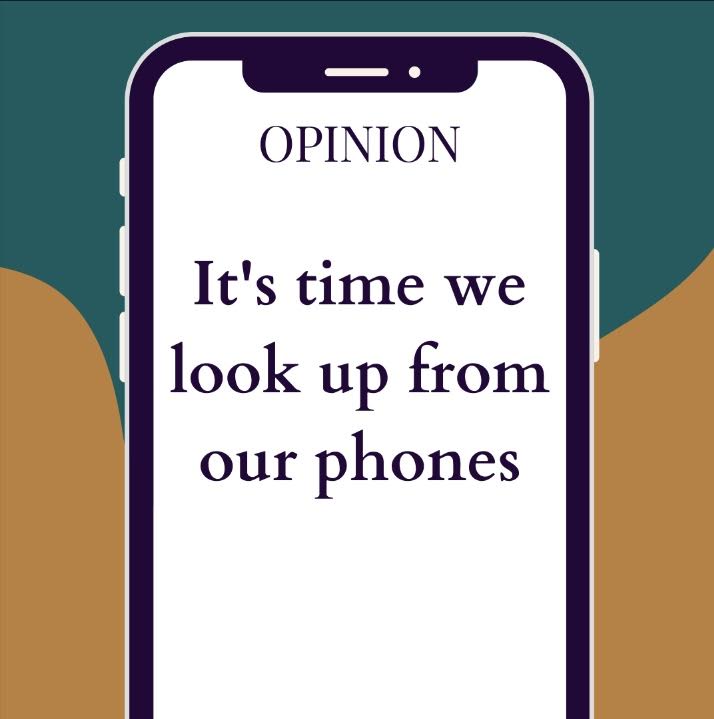It’s time we look up from our phones
For generations to come, immersion in advanced technology is here to stay
October 15, 2021
Excessive phone use: the new normal or a plague of addiction?
According to the CDC, teens are spending nearly a third of their day on their phone, with 11-14 year olds spending approximately nine hours a day and 15-18 year olds spending approximately seven and a half hours a day. It’s a valid question to ask, is this time well spent? How we spend our time is a direct reflection of our lives, interests and values. The effects of the considerable amounts of time spent on social media and phones is a remarkably nuanced issue, and there’s a wide spectrum of perspectives from all ages on these issues.
Three-fourths of teens aged 13-17 have at least one active social media profile, according to the American Academy of Child and Adolescent Psychiatry. Generation Z is arguably the first generation to grow up immersed in advanced technology, including social media. Social media giants such as Facebook need to further examine the implications of their sites and protect users accordingly due to the prevalent role social media plays in the lives of nearly all young people.
Recently, meaningful discussions surrounding sites like Facebook were sparked by the testimony made on Oct. 5 to a senate subcommittee by Ms. Frances Haugen, a former Facebook employee. In her testimony, Haugen argued that Facebook, which owns Instagram and Whatsapp, has repeatedly chosen profit over the wellbeing of its users and was aware of the negative effects Instagram has on teens. These discussions are crucial for not only making decisions on how to maximize user protection, but to also publicize information for users, especially teens, to understand the effects of social media and make decisions accordingly.
The (digital) social sphere: students weigh in
After numerous conversations with various OHS students, two themes have emerged. The first theme is something that may not be all that surprising: this generation is addicted to phones. Senior Katie Sager says that addiction to screens is a widespread issue, but it’s also not an easy habit to break. She said, “I think people aren’t aware of it either, and especially because of the pandemic we’ve kind of had to rely on our phones because we didn’t have much to do.” This addiction doesn’t just apply to phones either. On his phone usage habits at home, senior Dakota Kath said, “I feel like I need it for everything that I do, like I’ll be at home using my computer but I feel like I need to use my phone at the same time sometimes.” Just because screens do not appear to be harmful, they have the potential to become a legitimate addiction.
The other recurring point made by students touches on the sad reality of social media: the lack of repercussions for harmful actions. Sophomore Carter Hanson currently uses no social media, but is very aware of the nature of negativity surrounding it. He said, “You don’t have to face any repercussions if you do a bad thing except, like, people yelling at you over Twitter.” Of course, social media comments have little to no real-world consequences, and it’s doubtful that online criticism can stop the root of harmful online comments and behavior.
It also seems as though different social media apps have their own respective issues. Junior Beckett Seykora thinks that Instagram has the most issues out of the social media apps he uses, which include Instagram, Snapchat and TikTok. He said he believes the biggest issue on Instagram is hurtful comments. On top of this, he believes that the majority of Instagram does not reflect the real lives of people. On how many people act on Instagram, he said, “You kind of put on a show a lot.” Similarly, sophomore Nora Johnson, who also uses Instagram, Snapchat and TikTok believes that unkind actions are at the heart of the issue with Snapchat. She said, “People are just really rude on there.” If social media sites are the new recreational escape for young people, the overwhelming feedback that these sites aren’t positive and safe spaces is concerning.
Phones in the classroom
At OHS, excessive cell phone use poses not only problems for students but also teachers. Mr. Scott Pierce, who teaches business classes, says that although most kids listen when asked to put their phones away, some students face a continual struggle to stay off their phones in class. He said, “If there’s any opportunity at all for them to have it out and use it, they will, and some kids just have it and try to sneak it. It’s pretty obvious, but they just seem like they can’t stay off of them.” In addition to seeing issues in his classroom, Mr. Pierce also has concerns regarding the effect of social media usage on the wellbeing of his students. He said, “I think it can impair their emotional stability because they’re so worried about what’s going on and what people think of them and how they are perceived.” Teachers should be concerned about the effects that social media has on students–it can affect what they learn from class, their interactions with their peers, and most importantly, their mental health.
Although Mr. Pierce considers himself to be somewhat relaxed when it comes to phone usage in his classroom, some other teachers take a different approach. Mr. Will Fish, who teaches English, said, “In my class, if you’re not doing the work, if you’re not paying attention, if you’re on your phone doing something you shouldn’t be doing, you lose your phone.” Mr. Fish has little patience for the distraction of phones among his students, and perceives social media as not only an overall waste of time, but a detriment. He said, “I think it impairs their lives. I think it’s toxic. I think the whole social media thing is herd behavior at its worst.” Making an effort to curb phone usage in school has the ability to improve learning and academic performance. Additionally, it’s an act of mutual respect for teachers, whose profession is to give great effort to teach their students.

What should we do?
Reflections on issues regarding phone usage and social media beg the nuanced question of how to fix these problems for the generations of today and tomorrow. Despite the negatives, social media apps have the ability to positively impact lives, connect people and foster passions if used correctly. Kath suggests that a less overwhelming alternative to social media is texting. He said, “On Instagram you can see all these things and you’re like, ‘oh, I wish I were there, I wish I was doing this,’ that sort of thing, but then with text all you’re doing is conversing with people and then you still get that connection part of it.” Awareness of personal digital consumption and its effects are the key to finding a healthy balance in the digital social sphere.
Research from Facebook’s Teen Mental Health Deep Dive concludes that friends and family have the most positive impact on mental health. Regardless of whether these connections are made face-to-face or online, meaningful connections with others are crucial to wellbeing. Although the immersion of current and future generations in technology is inevitable, it is urgently important to appreciate and recognize the world beyond screens.



